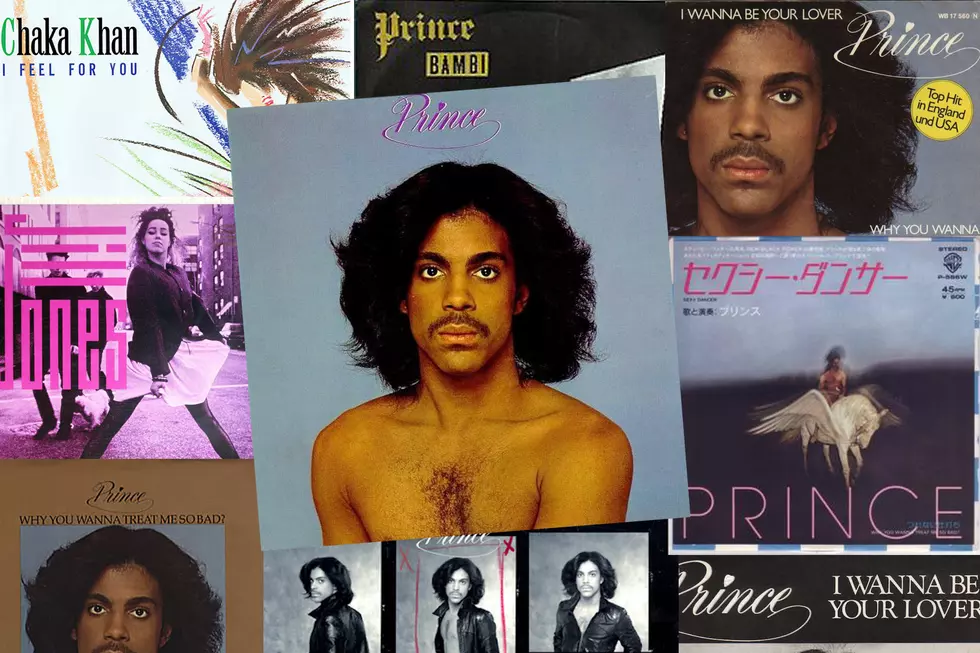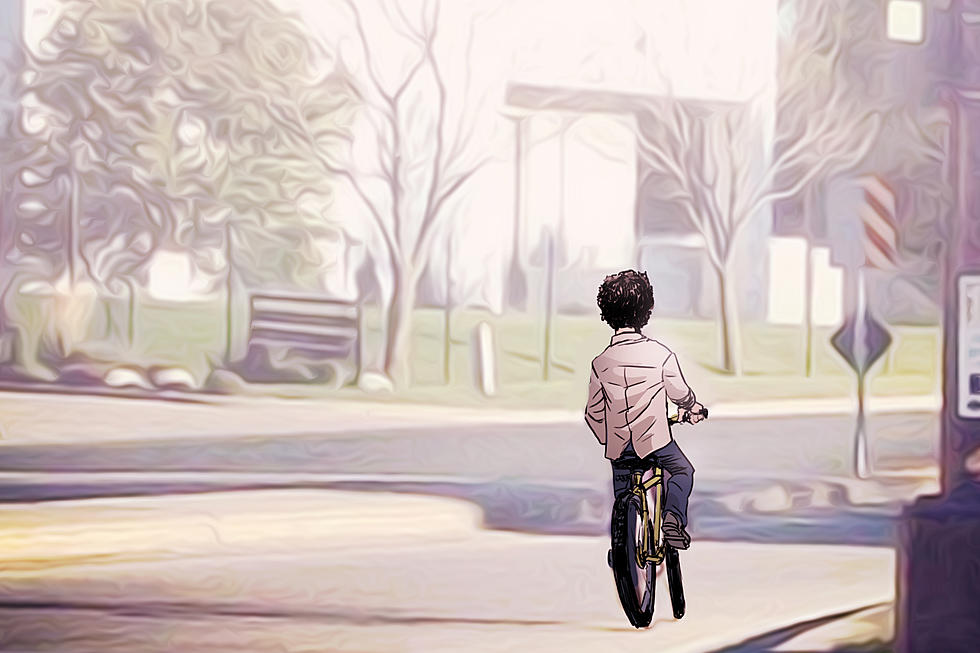
Prince Tops The Charts Again with ‘3121’: Track-By-Track Guide
Capitalizing on the mainstream momentum he built two years earlier with Musicology, Prince released 3121 in 2006.
The album debuted at No.1 on the Billboard 200, but failed to maintain the public’s interest. Still, it’s an interesting mix of pop, funk and rock. The project explores familiar spiritual and sexual themes, and it inspired what was arguably Prince’s last classic video. Here’s a track-by-track guide.
“3121”
Bassist Sonny T. and drummer Michael Bland’s funky, hypnotic beat ushers listeners into a world of “purple party people” in Japanese robes, who drink champagne in glasses with chocolate handles. Prince is a perfect Willy Wonka figure; he even rolled out a “golden ticket” promotion for the album. His voice is altered to a not-quite-Camille pitch, giving the song an even more whimsical flair. The drama builds with a horn line by Maceo Parker, Candy Dulfer, Greg Boyer and Ray Monteiro, followed by a climactic guitar solo by Prince. If you listen closely, you can hear the Purple One say, “From the lotus flower” at the beginning of the song. That statement, as well as references to “the wall of Berlin,” are hints of messages to come on Prince’s 2009 album, Lotusflow3r.
P.S. If you’d like to hear a version with Will.I.Am freestyling over the beat (seriously, it’s not bad), the 2006 BET Awards performance is still floating around online.
“Lolita”
Arguably the weakest song on the album, the poppy “Lolita” finds Prince retreading a subject that grew more tiresome as he got older. Following his conversion to the Jehovah’s Witness faith, he would, at times, trade overtly explicit content for innuendo that really didn’t hide much. Rather than focusing on lyrics about peeping Prince’s “stash,” it’s better to watch his live performance of the song on American Idol in 2006. You’ll be distracted by his strut onstage, his dancers — known as The Twinz — and Paula Abdul’s excitement.
“Te Amo Corazón”
Prince was no stranger to Latin-infused songs, and “Te Amo Corazón” is a breezy, beautiful addition to his repertoire. Released as the first single from the album, it failed to chart in the U.S., but was brought to life by the Salma Hayek-directed video. Prince is assisted musically by bassist Josh Dunham and drummer Cora Coleman, who had joined the Purple One’s live lineup. Overall, the song is a gem that should’ve gotten more traction with the general public, if only to demonstrate his versatility beyond his ‘80s sound.
Read More: Prince Says 'Te Amo Corazon' to Salma Hayek
“Black Sweat”
The album’s second single, “Black Sweat” is proof that Prince never lost his beat-making skills. The minimalist groove is funky and the lyrics are dripping with an age-appropriate swagger. It’s both a throwback to James Brown and a contemporary nod to hip-hop. Though sung in an unintimidating falsetto, when Prince warns, “You better take your woman and hide her,” you know not to question him. Though the recorded version is so memorable, the song began as an acoustic jam, according to PrinceVault. The song also inspired perhaps his last classic music video, featuring his trademark humor and sexiness. “He coined yet another phrase that people took and ran with,” Prince’s longtime keyboardist, Morris Hayes, said in an interview with The Current. “He was so good at taking a line that people would say and making it into something that everybody now associates with him.”
“Incense and Candles”
Prince approached each day like a work of art, and was very intentional about curating spaces, including his home, studio and hotel rooms. So, it was only a matter of time before he named a song, “Incense and Candles.” Some were put off by Prince’s use of Auto-Tune, which would soon experience a renaissance of sorts on hip-hop radio, led by artists like T-Pain, Lil Wayne and Kanye West. Prince also raps on the track, showing his penchant for innuendo with lines like, “I want to smother you with something as shiny as the rims upon my ride.” His protégé, Tamar Davis, provides backing vocals.
“Love”
After exploring the sensual world on the previous track, Prince gets spiritual with “Love,” which also features vocals by Davis. The song is based on a few Biblical scriptures, including Matthew 12:34 (“For out of the abundance of the heart the mouth speaketh"), which Prince quotes in the chorus. For years, Prince had been championing messages such as “God is Love,” “Live 4 Love” and “Love 4 One Another,” so “Love” fits nicely into his canon. He also streamed an acoustic version of the song on 3121.com.
“Satisfied”
“I ain’t talking about nothing physical,” Prince assures on this horn-soaked, Al Green-inspired track. “Foreplay starts in the mind.” It’s certainly not the first time Prince focused on coloring his lover’s imagination and building anticipation. For example, this theme is explored heavily on his 1994 album, Come -- specifically, it's second track, “Space,” on which Prince sings, “Everything I want to do to your body, baby, I would do to your head.”
“Fury”
“Should’ve been born on the Woodstock stage,” Prince sings on the 2015 song, “June.” Though Prince avoided speaking too much about Jimi Hendrix, an obvious influence, “Fury"'s guitar and vocal cadence is a tip of the hat to the ‘60s icon. However, the recorded version left many wanting more. “'Fury' tempers the impact of its stunning lead guitar part with a hopelessly dated keyboard patch and generic rock drumming,” Joe Tangari wrote in a review for Pitchfork. Indeed, “Fury” is best heard live. The 2006 Saturday Night Live performance has aged well, though it’s a bit jarring to see Prince set his guitar gently onstage rather than chucking it into the heavens.
“The Word”
You can dance until you sweat and talk about foreplay all you want, but you still have to read your Bible. At least that’s Prince’s philosophy. This track is a promotion of scripture and/or Jesus Christ (referred to as “the Word” in the Bible) as the way to salvation. You can find references to the devil, or “De-elevator” or “Spooky Electric” throughout Prince’s music, and in this song, he is warning against “the treachery of the Wicked One.” Featuring electronic programming and acoustic guitar, the song is slow, moody and a bit strange. It requires a few listens to absorb.
“Beautiful, Loved and Blessed”
This track is a highly spiritual collaboration between Tamar Davis and Prince. The two acknowledge God as their creator and the impact that recognition has on their lives. For Prince, spirituality seemed to help him adjust to the mercurial nature of fame. “I just want to be happy, come take this bitter cup from me,” he sings, referencing a quote by Jesus in the Bible (Luke 22:42). “It was the most emotional connection I'd ever had to anyone," Davis said. They also performed the song on Saturday Night Live. "It was so heavy spiritually for us,” she added.
“The Dance”
The original version of “The Dance” was released digitally on the 2004 album, The Chocolate Invasion, and has an urban, R&B sound. When Prince re-recorded the song for 3121, he emphasized more live instrumentation and complex musical passages. While both versions feature impassioned ad libs at the end, the latter includes Prince’s trademark scream.
“Get on the Boat”
The album ends on a joyous note with this Latin-infused, James Brown-esque workout. Prince and Davis even sing a bit in Spanish. During the 2000s, Prince reunited with past band members like Sheila E., who provides percussion on the track. The Biblical symbolism is blatant; there are connections to the Noah’s Ark story, as well as the Jehovah’s Witnesses’ belief that only 144,000 will be resurrected to heaven. “We were meant to live together underneath the sun,” Prince sings, and asks the same question that can be found on the title track at the top of the album: “Don’t you wanna come?”
More From WKFR










